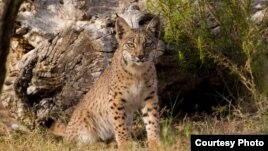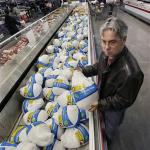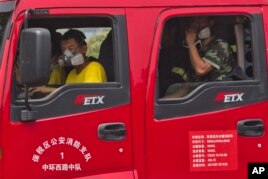Strong economic growth in Asia has lifted millions of people out of poor economic conditions. But some environmental activists say it has also hurt the area's environment. The International Union for Conservation of Nature met in Bangkok, Thailand recently for three days. The group urged Asian countries to work together to protect the environment. It warned that, if they fail to do so, many plants and animals will become extinct.
亚洲经济强力增长让数百万人脱离了贫困的经济状况。但是一些环保人士表示这也伤害了该地区的环境。世界自然保护联盟最近在泰国曼谷举行了为期三天的会议。该组织督促亚洲国家共同努力保护环境。该组织警告说,如果各国不这样做,许多动植物都会灭绝。
Asia produces about 40 percent of global economic activity and two thirds of global growth. About 60 percent of the world's population lives in Asia. Experts predict 3.3 billion people will live in Asian cities by 2050. About 1.9 billion live in the urban areas of Asia now.
亚洲大约制造了全球40%的经济活动和三分之二的增长。世界人口有大约60%居住在亚洲。专家预测到2050年将会有33亿人居住在亚洲各个城市。目前大约19亿人居住在亚洲的城市地区。
Asia's economic development has hurt its environment. Experts say more than 1,400 plants and animals in the area are critically endangered. In other words, they could soon no longer exist. About 95 per cent of Southeast Asia's coral reefs are at risk. And, wetlands that once covered tens of thousands of kilometers of shorelines are disappearing faster in Asia than anywhere else in the world.
亚洲的经济发展已经伤害了它的环境。专家表示,该地区超过1400种动植物处于极度濒危状态。换句话说,它们可能很快会不复存在。东南亚95%的珊瑚礁处于危险之中。而且,亚洲地区覆盖了数万公里海岸线的湿地正在以比全球任何地方都更快的速度消失。
Zhang Xinsheng is president of the International Union for Conservation of Nature. He says the planet's ecosystems are stressed and need new efforts by governments to limit losses.
章新胜是世界自然保护联盟的主席。他说,地球的生态系统承受着压力,需要各国政府采取新的措施来限制其损失。
"Can we (be) sustainable with this production pattern? Can we sustain with this consumption? So now it needs political will; it needs general awareness, but it needs also (a) change of values. We must review, we must reflect, we have to change the production pattern, we have to change the consumption model, we have to build inclusive societies."
他说,“我们这种生产模式是否可以持续?我们这种消费是否可以持续?所以它现在需有有政治意愿,需要有共识,但是它也需要改变价值观。我们必须回顾、反思,必须改变生产模式,改变消费模式,并建立包容性社会。
At the end of its meeting in Bangkok, the group urged governments, businesses and non-government groups to work together to help the environment.
在曼谷会议结束时,该组织督促各国政府、企业和非政府组织共同努力保护环境。
Yeshey Dorji is the Minister for Agriculture and Forests in Bhutan. He says it will not be easy to convince people to consider the long-term effects of their actions on the planet.
意西·多吉(Yeshey Dorji)是不丹农林部部长。他说,说服人们思考自己的行动对地球的长期影响不是一件容易的事。
"It's mainly the people going for short-term economic gains," he says. "I think that is the biggest challenge for conservation, like poaching, illegal trade -- this is for short-term economic gains which are actually the main driving force."
他说,“人们主要是为了短期的经济利益。我认为这是对环境保护的最大挑战,像偷猎、非法贸易,短期经济利益实际上它们的主要动力。”
Officials with the International Union for Conservation of Nature say 2015 is a turning point for Asia. The Asia Regional director of the IUCN, Aban Marker Kabraji, says an urgent effort is needed. He says Asian countries need to take the energy that fueled 50 years of economic growth and use it to secure the well-being of both nature and humans.
世界自然保护联盟官员表示,2015年是亚洲的一个转折点。世界自然保护联盟亚洲地区负责人卡布拉吉(Aban Marker Kabraji)表示迫切需要采取措施。他说,亚洲各国需要动用刺激了50年经济增长的能量来保护自然和人类的福祉。
I'm Jonathan Evans.
我是乔纳森·埃文斯。(51VOA.COM对本文翻译保留全部权利,未经授权请勿转载,违者必究!)
By VOA18 August, 2015
Strong economic growth in Asia has lifted millions of people out of poor economic conditions. But some environmental activists say it has also hurt the area's environment. The International Union for Conservation of Nature met in Bangkok, Thailand recently for three days. The group urged Asian countries to work together to protect the environment. It warned that, if they fail to do so, many plants and animals will become extinct.
Asia produces about 40 percent of global economic activity and two thirds of global growth. About 60 percent of the world's population lives in Asia. Experts predict 3.3 billion people will live in Asian cities by 2050. About 1.9 billion live in the urban areas of Asia now.
Asia's economic development has hurt its environment. Experts say more than 1,400 plants and animals in the area are critically endangered. In other words, they could soon no longer exist. About 95 per cent of Southeast Asia's coral reefs are at risk. And, wetlands that once covered tens of thousands of kilometers of shorelines are disappearing faster in Asia than anywhere else in the world.
 An Iberian Lynx. Mature cats numbered just 52 in 2002. (Credit: IUCN)
An Iberian Lynx. Mature cats numbered just 52 in 2002. (Credit: IUCN)Zhang Xinsheng is president of the International Union for Conservation of Nature. He says the planet's ecosystems are stressed and need new efforts by governments to limit losses.
"Can we (be) sustainable with this production pattern? Can we sustain with this consumption? So now it needs political will; it needs general awareness, but it needs also (a) change of values. We must review, we must reflect, we have to change the production pattern, we have to change the consumption model, we have to build inclusive societies."
At the end of its meeting in Bangkok, the group urged governments, businesses and non-government groups to work together to help the environment.
Yeshey Dorji is the Minister for Agriculture and Forests in Bhutan. He says it will not be easy to convince people to consider the long-term effects of their actions on the planet.
"It's mainly the people going for short-term economic gains," he says. "I think that is the biggest challenge for conservation, like poaching, illegal trade -- this is for short-term economic gains which are actually the main driving force."
Officials with the International Union for Conservation of Nature say 2015 is a turning point for Asia. The Asia Regional director of the IUCN, Aban Marker Kabraji, says an urgent effort is needed. He says Asian countries need to take the energy that fueled 50 years of economic growth and use it to secure the well-being of both nature and humans.
I'm Jonathan Evans.
Correspondent Ron Corben reported this story from Bangkok. Christopher Jones-Cruise adapted it for VOA Learning English. Mario Ritter was the editor.
Words in This Story
wetland(s) – n. an area of land (such as a marsh or swamp) that is covered with shallow water; usually plural
ecosystem – n. everything that exists in a particular environment; an ecosystem includes living things -- such as plants and animals -- and things that are not living -- such as rocks, soil, sunlight and water
sustainable – adj. able to be used without being completely used up or destroyed
consumption – n. the use of something (such as fuel)
model – n. a set of ideas and numbers that describe the past, present or future state of something (such as an economy or a business)
inclusive – adj. open to everyone; not limited to certain people
poach – v. to hunt or fish illegally; to catch or kill an animal illegally
driving force – idiomatic expression the person or thing that motivates or directs someone or something
Is your country's environment threatened by economic development? We want to hear from you. Write your thoughts in the comments section.









